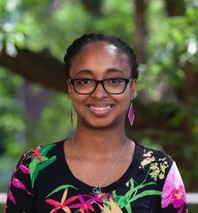Assistant Professor of Communication Science

Broadly, I focus on the ways in which communication outside of the clinical encounter may influence the clinical encounter or related perceptions, and vice versa. Much of this work has focused on examining the relationships between both interpersonal and mediated communication and medical mistrust, particularly for Black Americans.
What is your education/career background?
I hold both a BS in biology, with a chemistry minor, and a BS in psychology from the University of North Carolina at Chapel Hill. During senior year of undergrad, I realized I was unsure what was next. As a result, I looked for jobs instead of immediately going to graduate school. I was fortunate to work for three years as a Research Associate in Duke University’s Fuqua School of Business with a team looking at medical decision-making. Based on some of the work I did over the course of those three years, I realized that I was really interested in health communication and pursued graduate work in that discipline. I received my MA and PhD in communication from the University of Illinois at Urbana-Champaign
How have you navigated a career in STEM as a woman/underrepresented minority?
Creating a mentorship network has been critical to navigating my career. It has been essential for me to have mentors who a) share a part of my identity and thus, intimately know what it looks like to navigate these spaces asa Black person, person of color, woman, and/or an individual doing work related to racism and health or b) have done the work to understand, sympathize, and be someone who supports and champions folks from persistently marginalized groups.
What advice do you have for women/underrepresented groups pursuing an education/career in STEM?
I think this is true of many spaces and realms — take care of yourself. For many, especially those of us from persistently marginalized groups, the spaces and institutions we occupy were not meant for us. Often, our very presence can challenge the status quo. At times, the mental effort to even exist, let alone thrive, in these spaces can be exhausting – surround yourself with people who understand you and can pour back into you.
What do you enjoy most about your career/current role?
Right now, one of the things I enjoy most is working with really amazing, brilliant faculty and graduate students who share my desire to shift how we talk about health, change our orientation towards communities, ensure we don’t cause harm, and produce work that is not only intellectually interesting but has real-world impact.
What does diversity, inclusivity, and equity look like to you in your job sector? How do you incorporate DEI in your position?
Due to the nature of my job – I have three large buckets of things I am often doing – service, teaching, and research. DEI touches all of those facets in a variety of ways. At its broadest level, DEI often involves thinking about not only the policies and processes surrounding how academia functions and who winds up in the space, but also how I carry out my own work. For instance, I strive to incorporate DEI by doing things like: ensuring that the policies and practices that emerge from committees are inclusive and take structural barriers into account; helping reduce barriers for students, particularly those from persistently marginalized groups – at both the undergraduate and graduate level – as they navigate the “hidden curriculum;” exposing students’ to a diversity of lived experiences so they see that the choices related to health that individuals make are often constrained; encouraging students to think critically about how research is produced and whose voices are absent; and taking a more inclusive approach to my research (e.g., ceding power in the research process and allowing the communities I work with and for to have decision-making power throughout the entire process).
What is your favorite way to unwind?
My favorite way to unwind is probably working on a jigsaw puzzle or crocheting while watching sports.
X-@DrLDWilliamson